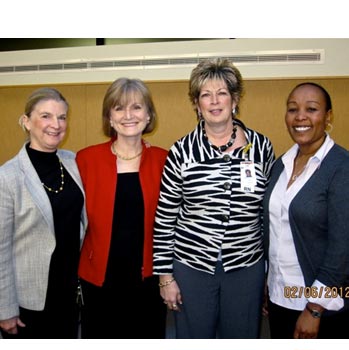Health Resources Service Administration (HRSA) Administrator Mary Wakefield, PhD, RN, recently stopped by UMass Medical School to learn more about how valuable HRSA resources are being deployed at the state’s only public medical school. Currently, 14 UMMS principal investigators lead 17 active HRSA grants totaling nearly $8 million.
With its mission to improve health and achieve health equity for all Americans, HRSA helps fill gaps in care for people who are uninsured, isolated or medically vulnerable. An agency of the U.S.
 |
|
| HRSA Administrator Mary Wakefield (second from left) visited UMMS on Feb. 6. She is pictured with, from left, Janet Hale, Donna Gemme, and Phylis Muthee |
Department of Health and Human Services (HHS), HRSA supports health professions programs that advance quality services, a skilled health workforce and innovative approaches—including many at UMass Medical School.
With its own focus on primary care, public health and serving the underserved paralleling HRSA’s mission, UMMS is home to numerous initiatives that have benefitted from substantial and sustained grants from the agency. “HRSA has a significant investment here,” Dr. Wakefield said. “We want to be good partners with our grantees while forwarding the priorities on HHS’s agenda.”
A major priority for the Obama administration is health care workforce development, which is essential to the successful implementation of national health care reform. “As people have more coverage, we have to be sure that they have services available to them,” Wakefield explained. Most of the current UMMS HRSA grants are focused on workforce development for primary care physicians, advanced practice nurses and community health workers.
HRSA-funded workforce development projects administered by the Department of Family Medicine & Community Health, the Graduate School of Nursing and the Massachusetts Area Health Education Centers (MassAHEC) Network include those for residency training and physician faculty development in primary care; advanced nursing education expansion; nurse faculty loans; and geriatric academic career awards. Other UMMS HRSA grants include those for the New England AIDS Education and Teaching Center and Leadership Education in Neurodevelopmental and Related Disorders training.
Wakefield listened with keen interest as the group (see sidebar) shared challenges as well as successes experienced with HRSA support. Impressed by participants’ collaborative and interdisciplinary as well as individual efforts—many have worked together on related projects, such as establishing residencies for primary care physicians, psychologists, nurses and pharmacists at community health centers—she asked several participants to submit summaries of their activities for her to share with HHS colleagues as exemplary practices for innovation and interdisciplinary collaboration. “We are looking for new ideas,” she said in closing.
| A meeting of like-minded leaders and innovators Hosted by James Leary, associate vice chancellor for community and government relations, and Kola Akindele, manager of the Office of Community Relations and Government Affairs, HRSA Administrator Mary Wakefield, PhD, RN, met with these recipients of HRSA funding at UMMS. |
||
|
Daniel Lasser, MD |
Kathleen Miller, EdD professor of nursing, associate dean for advanced practice programs and director of the Doctor of Nursing Practice Program for the Graduate School of Nursing Nancy Morris, PhD associate professor of nursing Phyllis Muthee, RN GSN master’s program student Donna Gemme MS, RN, associate chief nursing for UMass Memorial Medical Center and a GSN Doctor of Nursing Practice student Linda Cragin, MS director of MassAHEC Network |
|